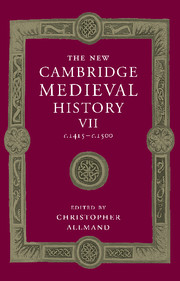Book contents
- Frontmatter
- PART I GOVERNMENT
- PART II ECONOMIC AND SOCIAL DEVELOPMENTS
- PART III SPIRITUAL, CULTURAL AND ARTISTIC LIFE
- 10 Religious Belief and Practice
- 11 Schools and Universities
- 12 Humanism
- 13 Manuscripts and Books
- 14 The Beginning of Printing
- 15 Architecture and Painting
- 16 Music
- PART IV THE DEVELOPMENT OF EUROPEAN STATES
- Appendix Genealogical Tables
- Primary Sources and Secondary Works Arranged by Chapter
- Index
- Frontispiece
- Plate section
- Map 1 European towns in the late Middle Ages
- Map 2 European commerce and trade
- Map 4 Winds and currents facilitating the discoveries
- Map 5 The universities o f Europe in 1400 and 1500
- Map 6 Germany and the Empire
- Map 20 The Roman Orthodox and Ottoman worlds in the fifteenth century
- References
12 - Humanism
from PART III - SPIRITUAL, CULTURAL AND ARTISTIC LIFE
Published online by Cambridge University Press: 28 March 2008
- Frontmatter
- PART I GOVERNMENT
- PART II ECONOMIC AND SOCIAL DEVELOPMENTS
- PART III SPIRITUAL, CULTURAL AND ARTISTIC LIFE
- 10 Religious Belief and Practice
- 11 Schools and Universities
- 12 Humanism
- 13 Manuscripts and Books
- 14 The Beginning of Printing
- 15 Architecture and Painting
- 16 Music
- PART IV THE DEVELOPMENT OF EUROPEAN STATES
- Appendix Genealogical Tables
- Primary Sources and Secondary Works Arranged by Chapter
- Index
- Frontispiece
- Plate section
- Map 1 European towns in the late Middle Ages
- Map 2 European commerce and trade
- Map 4 Winds and currents facilitating the discoveries
- Map 5 The universities o f Europe in 1400 and 1500
- Map 6 Germany and the Empire
- Map 20 The Roman Orthodox and Ottoman worlds in the fifteenth century
- References
Summary
a discussion of Renaissance humanism must begin with Burckhardt, whose The civilization of the Renaissance in Italy has set the terms of debate and analysis from the time of its publication in 1860 up to the most recent scholarship. Burckhardt’s interpretation of humanism was not particularly novel, but he stated his views with powerful simplicity and systematic logic. No scholar can now accept Burckhardt’s thesis as a whole, but it must be conceded that he raised the crucial historical issues concerning humanism.
For Burckhardt, the Renaissance was not fundamentally about the revival of Antiquity: ‘the essence of the phenomena might still have been the same without the classical revival’, which had ‘been one-sidedly chosen as the name to sum up the whole period’. In Burckhardt’s view, instead, the ‘characteristic stamp’ of the Renaissance was a new spirit of individualism. What was reborn in Italy from the mid-thirteenth to the early sixteenth century was not classicism but rather man himself.
Keywords
- Type
- Chapter
- Information
- The New Cambridge Medieval History , pp. 243 - 277Publisher: Cambridge University PressPrint publication year: 1998
References
- 6
- Cited by

